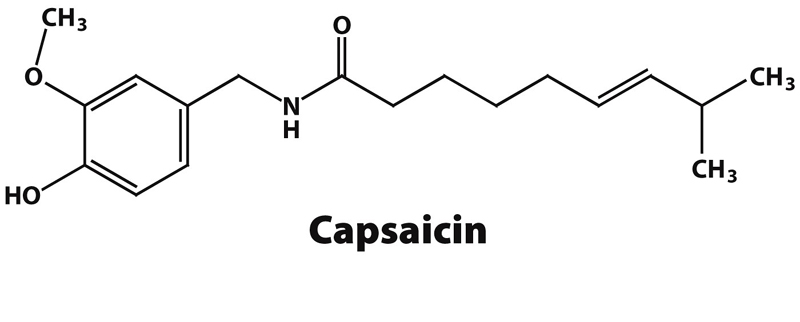Across the globe, there are countless types of cuisine from every country and geographical region you visit, each with their own unique flavors and ingredients catering to a variety of pallets. One flavor that many people crave regardless of where they are in the world is spice. Spicy food is found in nearly every cuisine you look at (Korean kimchi to Mexican salsas to American buffalo chicken to Indian curries). Me personally being a lover of spicy foods, I decided to look into any health benefits spice in your diet might have.
What makes peppers spicy if a substance called capsaicin. According to this article, the body’s reaction to spicy food of feeling hot, sweating, and feeling a burning sensation is caused by the signal that capsaicin sends to your pain receptors. Capsaicin affects the body’s pain receptors because your does not recognize the sensation of spice as a taste but rather as a pain stimulus.

I came across an observational study conducted by Lu Qi, an associate professor at the Harvard School of Public Health. The objective of this study was to see if there is a correlation between frequency of consumption of spicy foods and total as well as cause specific mortality. This study was conducted with participants from 10 geographical regions in China aged 30 – 79. The study consisted of 199,293 men and 288,082 women and were enrolled over the years of 2004 – 2008. The participants were screened for any preexisting conditions as well as conditions that they are genetically predisposed to.
After a median of 7.2 years in a follow up, the results were that consumption of spicy food was inversely correlated to total mortality by 14%. The inverse correlation also was true for deaths due to cancer, ischemic heart diseases, and respiratory diseases. The results also showed that women that consumed more spicy food were less likely die of infections.
Now obviously these results do not speak on behalf of everyone across the globe. As we have certainly learned in SC200, correlation does not causation. There does not seem to be any evidence of the Texas Sharpshooter problem playing any role in the results of this experiment. Since it was a completely observational experiment, it is very unlikely that there is any bias by the lab that conducted the experiment and it appears that many confounding variables were accounted for prior to observing the participants. This study was only conducted in China so there can certainly be some variations in results if this was conducted in other parts of the world. This can be due to many different reasons such as geographical influences on peoples’ bodies, tolerance of spice, eating frequency habits, etc.
One thing that I would certainly love to explore further is the mechanism of how exactly capsaicin affects the human body and potentially lead to better health. I also would love to see the flipside of this coin and look into the negative effects spicy food has.

Images:
http://www.natures-health-foods.com/images/chili-pepper.jpg
http://www.essentialoil.in/images/capsaicin.jpg

After reading this it made me feel better because I love spicy foods and eat them frequently. Spicy food has a bunch of health benefits. I found an article showing more health benefits that spicy foods have like aiding in weight loss and improving people’s moods!
http://www.today.com/health/spicy-foods-health-effects-adding-heat-your-meal-t73591
I never thought spice had anything to do with a longer lifespan but after looking at the study you presented in your post, it looks to be the case. I would hope to soon see similar studies in other areas of the globe to support these findings, producing a meta-analysis on this notion. I read up a little on how spicy foods may extend life and it turns out that spicy food consumption has been linked to cancer prevention (link below). I have never been a fan of spicy foods (not even hot salsa) but maybe next time I have an opportunity, I’ll add some Tabasco to my food!
http://www.naturalhealth365.com/spicy-foods-longevity-1699.html
I don’t think that spicy food consumption has anything to do with a persons risk of death. The problem with the study is that it looks at spicy food consumption and mortality rate by region. Specific areas of the world consume more spicy food than others and also have unrelated mortality rates. I think that the most reasonable conclusion is that a third variable, such as society and environment, effects individuals consumption of spicy foods and their death dates. Here is a contradicting study that links spicy food consumption with longer life
https://www.hsph.harvard.edu/news/features/frequent-spicy-food-consumption-linked-with-lower-death-risk/
I don’t think that spicy food consumption has anything to do with a person risk of death. The problem with the study is that it looks at spicy for consumption and mortality rate by region. Specific areas of the world consume more spicy food than others and also have unrelated mortality rates. I think that the most reasonable conclusion is that a third variable such as society and environment effect individuals consumption of spicy foods and their death dates. Here is a contradicting study that links spicy food consumption with longer life
https://www.hsph.harvard.edu/news/features/frequent-spicy-food-consumption-linked-with-lower-death-risk/